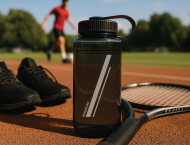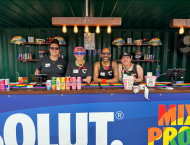Eat
 Illustration: Nick Caracciolo
Illustration: Nick Caracciolo
Devoured Offers Sustainable Alternative For DC Waste
March 30, 2019 @ 12:00am
Americans excel at wasting food. According to an article on the Environmental Protection Agency (EPA)’s website, the country disposed of 37.6 million tons of food waste – with nearly 94 percent of it going to landfills or combustion facilities – in 2015. Essentially, it was rendered uneaten and utterly useless.
The simplest way to reduce these numbers is to cut back, but for most, reducing waste is not that simple. Another alternative is being realized in the District by local company Devoured, which strives to help businesses in the city be more responsible by turning what could be trash into compost.
Founder Walker Lunn set out to help the World Bank Group cut down on their waste in 2006. As a student studying hospitality management, he began piecing together a program that would help redirect food products thrown away to compost facilities rather than landfills or incineration facilities.
Lunn says, “Once we started working with [the World Bank], it became a question of, ‘How do we stop this problem?’” When food waste goes to a landfill, it ends up rotting in an anaerobic environment and produces methane. It causes global warming and takes what could be a valuable resource and loses it forever. What we do is take it to a compost facility where the waste is mixed with sticks, leaves and grass, and it’s decomposed.”
According to the EPA, compost is organic material that helps plants grow. Made up largely of food scraps and yard waste, at least 30 percent of what we throw into a trashcan could instead be used as compost. The soil supplement is sold at retail locations such as Home Depot and other gardening outlets.
“Everyone we spoke with – restaurants and hotels – were like, ‘This is cool [and] we want to do it, but we’re concerned about cost,’” Lunn says. “Cost, space, odor and training were really the things that came up at first.”
Lunn and his team began working on a model that would enable Devoured to pick up the heaviest, wettest, most challenging parts of waste to transport to compost facilities, which are generally farther than landfills or transfer stations. In order to reduce odors, the company makes frequent pickups for their client base, which is largely made up of office buildings and hotels throughout the week.
“When we started, we couldn’t get another company to haul it,” Lunn says, laughing. “I wanted to hire a contractor, but I couldn’t get anyone to do it. The only compost company was in Cambridge, Maryland, so it was really tough. So much has changed.”
One of these changes is the frequent use of biodegradable, compostable products such as cups, plates and bowls.
“It’s transformed what we transport because it used to be mostly food,” he says. “Now a huge part of what we collect is packaging. I don’t think there’s any point of buying a compostable product unless you send it to a compost facility. Like any business, we have a sales process, and our business is mission-driven.”
With the increase of waste and global warming awareness, there’s no question the business has grown. And while some companies reach out to Devoured specifically because of their own green initiatives, there are others who are still looking to minimize their hefty trash bills.
“It’s case by case,” Lunn says. “[For] some of our clients, it’s part of their mission. For professionally managed business, the interest and willingness to do it comes from the benefits it provides, but the justification is typically driven by savings – or at the very least, breaking even.”
Another change in the past decade has been the competition. With a heightened awareness of food waste and the damages it can cause to the environment, Lunn is no longer the only game in town. Despite this, he maintains that his clients are ones that other businesses envy; looking ahead, he’s largely hopeful for what’s in store for Devour.
“Scaling up is part of [growth].”
To learn more about Devoured, visit www.devoured.co. Contact Lunn and his team at [email protected] or 202-810-9751.







